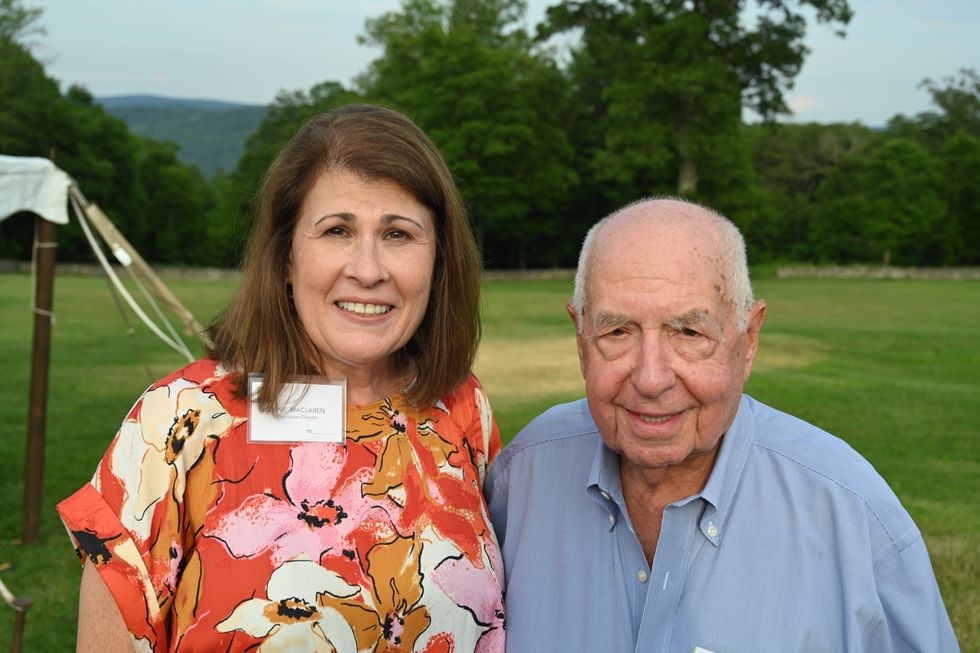Latest News
High-speed action made for a weekend of excitement at Lime Rock Park Friday and Saturday, June 27-28.
Photo by Simon Markow
LAKEVILLE — For the first time since 2011, Lime Rock Park hosted National Association for Stock Car Auto Racing events June 27 and 28.
It was billed as the largest event in modern track history with an estimated 20,000 fans attending.
The action kicked off Thursday, June 26, when a massive hauler parade rolled into town. A “Pit Stop Party” was held at the White Hart Inn in Salisbury where drivers signed autographs and met with fans.

Dan Winkley, hotel manager at the White Hart, said, “We’re super excited to have NASCAR in our town. We have elevated our staffing levels. We’ve got all hands on deck ready to go to welcome in the big crowds.”
One of the drivers at the White Hart was Ben Maier, a 16-year-old making his NASCAR truck series debut. “I’m pretty excited to just figure out the car and figure out what I’m getting into,” he said.
Toni Breidinger, the lone female truck racer of the weekend, said, “I’m most excited to be at a new track. I’ve never been here before, so I think that’s really fun.”
Maier and Breidinger both competed in the NASCAR Craftsman Truck Series, a national circuit known for launching the careers of stars like Kyle Busch, Kevin Harvick and Chase Elliott.

On Friday, June 27, at about 11 a.m., the members of the parking team at Trinity Episcopal Church across the street from Lime Rock Park were ready for action. Visitors could park their cars in the field and take a short and leisurely stroll over to the track.
Meanwhile, crews were hard at work in the paddocks. Drivers prepared for racing, emergency personnel were on duty and the LRP staff helped guests enjoy a day at the track.
Buz McCall, driving a 1998 Monte Carlo, was getting laps in ahead of the NASCAR Classic series race later that night. At 78 years old, McCall was the oldest driver of the weekend. His opponent, Ray Webb, had raced against McCall many times in the past and said he remains a tough competitor. “He’s still got it. Oh yeah.”
Kent firefighter P.J. Haviland was stationed near the pit lane in case of emergency. He said training for the event was extensive and covered most possible scenarios. “It was a simulator,” Haviland explained, which included extinguishing propane fires, cutting off power inside cars, removing steering wheels and similar rescue procedures. Of his trackside post, he said “It’s great.”

Another area firefighter, Carter Lotz of Canaan Fire Company, missed the training simulation but was still eagerly trying to get as close to the track as permitted. After being denied entry to the A Paddock, he spotted a Lakeville Journal intern with media credentials. “Want to swap wristbands?” Lotz unsuccessfully asked his former Housatonic Valley Regional High School classmate.
Some current HVRHS students were hard at work in the Paddock Concession Stand. During a lull in the line, Gustavo Portillo, Wyatt Merwin and Sam Berry spoke of the efforts that went into the weekend.
“It was a lot of prep. A lot of wrapping, burgers, patties and everything,” said Portillo. “It hasn’t been too busy,” Portillo said of the Friday crowd, but Berry noted, “The main races are tomorrow.”

Saturday afternoon brought perfect summer weather for the NASCAR Craftsman Truck LIUNA 150 Race at 1 p.m.
Rev. Heidi Truax of Trinity Episcopal Church gave the pre-race invocation.
“Racing in beautiful Lime Rock reminds me of the psalm 'I lift up my eyes to the hills,' but our eyes are focused right now on the track, not so much the hills,” she said at the start of her prayer.
The park was packed for race day.

Finn Scribner, of Torrington, was attending his first NASCAR race. “It’s good. It’s loud,” said Scribner. “First time I’ve been here since I was 5 or 6. My grandparents got me tickets for my birthday.”
Frankie Muniz, former star of the TV show “Malcom in the Middle,” competed in the truck series race driving the No. 33 Ford F-150.
The LIUNA 150 was won by Corey Heim in dominant fashion, leading nearly every lap of the race. It was his fifth Craftsman Truck series win this season.
After his first-ever race in Lakeville, Heim said, “Seeing the atmosphere and the fans that came out was super cool. Everyone seemed so excited to have NASCAR at Lime Rock. Really hoping they continue this trend and we can come back in the future.”

The ARCA Menards Lime Rock Park 100 was won by Thomas Annunziata, marking his first career ARCA victory. It was his second race at LRP this year after finishing 2nd in the Trans Am 2 Classic in May.
Lime Rock Park CEO Dicky Riegel commented on Annunziata, “He’s a son of Lime Rock Park. You know, that guy, all he does here is win and podium.”

At the end of the action-packed weekend, Riegel said, “It’s been amazing. After three years of putting this together, it’s just been fantastic.”
Concrete attendance numbers were not available, but Riegel said it was “absolutely a modern record for this place.”
This article was written by Riley Klein with reporting from Simon Markow.

Keep ReadingShow less
Joseph Robert Meehan
Jun 25, 2025
SALISBURY — Joseph Robert Meehan the 2nd,photographer, college professor and nearly 50 year resident of Salisbury, passed away peacefully at Noble Horizon on June 17, 2025. He was 83.
He was the son of Joseph Meehan the 1st and his mother, Anna Burawa of Levittown, New York, and sister Joanne, of Montgomery, New York.
He is predeceased by his wife, Elsie Lynn Meehan who passed away in November of 2023.
He leaves behind a son, Joseph Cortese, of Upton Massachusetts, his wife Mary and grandchildren, Michaela (Cortese)Donabedian, her husband Sevag and his great grandson, Ari, of Hopkinton, Massachusetts.
His grandson, Joseph Cortese, of Barrington, Rhode Island, and his granddaughter, Jaclyn Cortese of Tamworth, New Hampshire.
He also leaves behind his daughter, Kathleen Cortese Zito and husband Dominic, their three children, Michael, Alessandra, and Mathew Zito of Broomall, Pennsylvania.
After teachingpsychology at Dutchess Community College in Poughkeepsie, starting in 1968, his40-year career in photography started in the mid to late 70’s and has included assignment work for a wide variety of commercial and editorial publications. Over a thousand of his photographs have appeared in newspapers, books, magazines and on web sites for clients such as Nikon, and Hasselblad cameras, SanDisk memory cards, Tiffen Filters, Fujifilm, Eastman Kodak, the U.S. Army, National Geographic, the Smithsonian Museum and the U.S. Department of the Interior.
His work ranged from the beauty of the Salisbury areato an expedition photographer for arctic animal studies in the high Canadian Arctic, photographing Inuit hunters in Northern Greenland to landscape work in other extreme locals such as Death Valley, California.
Portfolios of his work have featured in such magazines as Outdoor Photographer, Shutterbug, Rangefinder and Popular Photography and his style has been characterized by the New York Times as “…alive with color and sparkling with light.”
He also served as the technical editor of Photo District News for over a decade, writing about new technologies and products and was the former editor of the Photography Yearbook. He has authored over 20 books on photographic technique many of which have received “best book” awards and have been translated into several languages.
Born in New York City, he was a 1959 graduate of Levittown High School, Levittown, New York.
He received his baccalaureate degree with honors from Columbia and a Master of Arts degree from Manhattan College. He has taught photography on the college level in the U.S., England and at the National Academy of Arts in Taiwan and gave workshops at the Palm Beach Photographic Centre in West Palm Beach, Florida.
His eye always saw the beauty of the Salisbury area through alens and he captured those images in an area that he and his wife Lynn loved.
When they were not on/in and around the lake, he and Lynn didn’t miss any of their grandchildren’s big events.Joe took great pride in photographing all these memorable events.
His beautiful images will always be here for all to appreciate.
Funeral services are under the direction of Newkirk-Palmer funeral home and a graveside service will be held this Friday, June 27, 2025, at 11 a.m. at St. Mary’s Cemetery, 18 Cobble Road, Salisbury, Connecticut.
Keep ReadingShow less
Florence Olive Zutter Murphy
Jun 25, 2025
STANFORDVILLE, New York — It is with profound sadness that we announce the passing of Florence Olive Zutter Murphy, who went home to be with the Lord on June 16, 2025, at the age of 99.
She was born in Sharon, Connecticut on Nov. 20, 1925, and was a long time resident of the Dutchess County area.
She was a devoted mother, loving wife to James Francis Murphy, who passed on Oct. 11, 1971, and a dear friend to many.
Florence, who was also known as Flo, managed a dairy farm for many years on Carpenter Hill Road in Pine Plains, New York. She is remembered for her delicious home cooked meals.
After raising her children she became an avid square dancer, racketball and tennis player. She then discovered her love for bike riding. She enjoyed embarking on bike tours well into her mid 80’s. When Flo wasn’t out riding her bike she could be found taking care of her property. She loved gardening, clearing the woods and building rock walls one stone at a time.
Florence was an amazing woman of great integrity, strength and tenacity. She was adored, respected and greatly loved by her family and those who knew her.
Florence is survived by her seven children — Bonnie June Chase, James Albert Murphy, Donna Sue Strauss, Jackie Lynn Merwin Disher, Glenn William Murphy, Lori Lee Mora and Clint Evan Murphy as well as 16 grand children and 20 great grand children.
She will always be remembered and greatly missed.
The Kenny Funeral Home has care of arrangements.
Keep ReadingShow less
Chore Service hosted 250 supporters at it’s annual Garden Party fundraiser.
Bob Ellwood
On Saturday, June 21, Mort Klaus, longtime Sharon resident, hosted 250 enthusiastic supporters of Northwest Corner’s beloved nonprofit, Chore Service at his stunning 175-acre property. Chore Service provides essential non-medical support to help older adults and those with disabilities maintain their independence and quality of life in their own homes.
Jane MacLaren, Executive Director, and Dolores Perotti, Board President, personally welcomed arriving attendees. The well-stocked bar and enticing hors d’oeuvres table were popular destinations as the crowd waited for the afternoon’s presentations.

The Garden Party is Chore Service’s only major fundraising event of the year, so it was not only a wonderful social activity, but a vital support mechanism to keep our most vulnerable residents in their homes.
First to present was MacLaren, who underlined the organization’s mission, thanked all caregivers for their important work, and said, with gratitude, to all donors, “Our accomplishments are your accomplishments.”
Ellen Ebbs, a Litchfield resident and Chore client, delivered a powerful and deeply personal testimony, sharing how the organization’s services transformed her life after a serious fall left her “disabled, dependent, and depressed.” Her story resonated with the audience and highlighted the vital impact of Chore’s work.

Patrick Roy, high-energy incoming Chair of the Board, as well as First Selectman of Roxbury and Chief of its police force, told the crowd of his “Fragile List” — those in the community a step away from losing their independence, and how he ensured that this group was adequately taken care of. Priscillia McCord, outgoing Board Chair after twelve years of unstinting service, asked for donations for Fund the Cause, urgently needed to support the recently-expanded transportation services before funding runs out in September. As Patrick Roy said, “In rural towns like ours, our clients depend on us for basic services — to get to their medical appointments, go grocery shopping, as well as life-enhancing activities like going to the library and getting a weekly lift to visit family and friends.” Both Roy and McCord emphasized the area of greatest current concern — that of an upcoming decrease in federal funding, something we will learn more about in August.
Chore Service supports the towns of Cornwall, Falls Village, Goshen, Kent, Litchfield, Morris, Norfolk, North Canaan, Roxbury, Salisbury/Lakeville, Sharon, Warren, and Washington.
For those interested in accessing services or providing them, please contact Chore Service at (860) 435-9177. To learn more about the organization or to donate, go to www.choreservice.org.
Sally Haver has lived in the Berkshires, on and off, since the mid-’70’s and her horse lives in Amenia.
Keep ReadingShow less
loading







